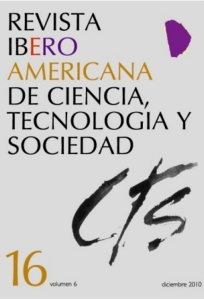Internacionalización de investigadores argentinos
el papel de la movilidad hacia España
DOI:
https://doi.org/10.52712/issn.1850-0013-804Keywords:
internationalization of research and higher education, international mobility of researchers, scientific cooperation, IberoamericaAbstract
This article aims to analyze the role of mobility to Spain in the process of internationalization of Argentinean researchers. Using different unexploited sources, the article tries to draw a more complete and detailed picture of the process, as it may be observed in the trajectories of researchers as in the impacts of programs of international cooperation or scholarships for graduate studies abroad. The importance for the Argentinean academic community of Spanish universities, researchers and research groups has been steadily growing along the last twenty years. The information compiled and systematized in this article leads to a more accurate appreciation of that trend.
Downloads
References
ALTBACH, Philip G. y Ulrich TEICHLER (2001): “Internationalization and Exchanges in a Globalized University”, Journal of Studies in International Education, 5: 5.
AURIOL, L., B. FELIX y E. FERNANDEZ-POLCUCH (2007): “Mapping Careers and Mobility of Doctorate Holders: Dratf Guidelines, Model Questionnaire and Indicators”, OECD Science, Technology and Industry Working Papers, 2007/6, OECD Publishing.
BALLATORRE, Magali (2008): L'expérience de mobilité des étudiants ERASMUS: Les usages inégalitaires d'un programme d'échange. Une comparaison Angleterre/France/Italia, Thèse pour obtenir le grade de Docteur en Sociologie de l'Université Aix-Marseille I et dell'Università degli studi di Torino.
BRANDI, María (2008): “La historia del brain drain”, CTS - Revista Iberoamericana de ciencia, tecnología y sociedad, N° 7, Volumen 3, pp. 65-87.
CASTRO, Javier A. (2003): Fondos competitivos y cambio académico e institucional en las universidades públicas argentinas. El caso del Fondo para el Mejoramiento de la Calidad Universitaria (FOMEC), documento de trabajo N° 110, Universidad de Belgrano, disponible: http://www.ub.edu.ar/investigaciones/dt_nuevos/110_castro.pdf
COMMANDER, Simon, Mari KANGASNIEMI y Alan WINTERS (2004): “The brain drain: A review of theory and facts”, Brussels Economic Review, Vol. 47 - n°1.
D'ONOFRIO, María Guillermina, Rodolfo BARRERE, Manuel FERNÁNDEZ ESQUINAS y Daniela DE FILIPPO (2010): “Motivaciones y dinámica de la cooperación científica bilateral entre Argentina y España: la perspectiva de los investigadores”, CTS - Revista Iberoamericana de Ciencia, Tecnología y Sociedad, Volumen 6, Número 16.
HUISMAN, Jeroen, Anneke LUIJTEN-LUB y Marijk VAN DER WENDE (2005): “Explaining Domestic Responses to European Policies: the Impact of the ERASMUS Programme on National Higher Education Policies”, en Tight, Malcolm (editor) International Perspectives on Higher Education Research Volume 3: International Relations, Department of Educational Research, Lancaster University, Lancaster, UK, Elsevier.
KEHM, Barbara M. y Ulrich TEICHLER (2007): “Research on Internationalisation in Higher Education”, Journal of Studies in International Education, Vol. 11, No. 3-4, pp. 260-273.
LUCHILO, Lucas (2006): “Las trayectorias de los profesionales con doctorado: un estudio internacional”, en El Estado de la Ciencia. Principales Indicadores de Ciencia y Tecnología Iberoamericanos / Interamericanos 2005, Buenos Aires, RICYT.
MALTRÁS BARBA, Bruno (2003): Los indicadores bibliométricos: fundamentos y aplicación al análisis de la ciencia, Ediciones Trea.
MARGINSON, Simon (2009): “The Academic Professions in the Global Era” en J. Enders y E. de Weert (eds.): The changing face of academic life. Analytical and Comparative Perspectives, Palgrave Macmillan.
MEYER, J. B. y J. CHARUM (1995): “La 'fuite des cerveaux' est-elle épuisée?Paradigme perdu et nouvelles perspectivas”, Cahiers des sciences humaines, vol 31, nº 4.
ORTIZ, Renato (2009): La supremacía del inglés en las ciencias sociales, Buenos Aires, Siglo XXI Editores.
OSZLAK, O., A. TROMBETTA D. ASENSIO (2003): Evaluación del Programa Fondo para el Mejoramiento de la Calidad Universitaria, Buenos Aires, Secretaría de Políticas Universitarias, disponible en http://webfmn.unsl.edu.ar/otrossitios/cucen/reuniones/reunion2/Informe_Preliminar_D iagnostico_FOMEC_200302.pdf
OZDEN, Caglar (2005): “Brain Drain in Latin America”, documento presentado al Expert Group Meeting on Internacional Migration and Development in Latin America and the Caribbean, Naciones Unidas, México, 30 de noviembre al 2 de diciembre.
RECOTILLET, Isabelle (2003): Availability and characteristics of surveys on the destination of doctorate recipients in OECD countries, OECD, STI Working Paper 2003/9.
SEBASTIÁN, Jesús, Celia DÍAZ, Manuel FERNÁNDEZ ESQUINAS y Rosa SANCHO (2010): “Radiografía de las interacciones institucionales de cooperación académica y científica entre Argentina y España”, CTS - Revista Iberoamericana de Ciencia, Tecnología y Sociedad, Volumen 6, Número 16.
TEICHLER, U. (1998): “The role of the European Union in the internationalisation of higher education”, en P. Scott (ed.): The Globalisation of Higher Education, Buckingham, SRHE and Open University Press.
VINCENT-LANCRIN, Stéphan (2006): “What is changing in academic research?Trends and future scenarios”, European Journal of Education, 41, 2.
Downloads
Published
How to Cite
Issue
Section
License
Copyright (c) 2024 CC Attribution 4.0

This work is licensed under a Creative Commons Attribution 4.0 International License.
All CTS's issues and academic articles are under a CC-BY license.
Since 2007, CTS has provided open and free access to all its contents, including the complete archive of its quarterly edition and the different products presented in its electronic platform. This decision is based on the belief that offering free access to published materials helps to build a greater and better exchange of knowledge.
In turn, for the quarterly edition, CTS allows institutional and thematic repositories, as well as personal web pages, to self-archive articles in their post-print or editorial version, immediately after the publication of the final version of each issue and under the condition that a link to the original source will be incorporated into the self-archive.











